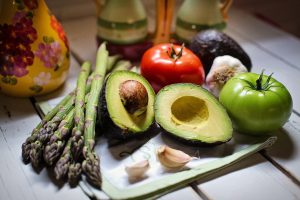
January is Veganuary, an invitation to dip your toe into veganism for an entire month at the beginning of each new year. For many people, the idea of veganism seems too extreme. The words "vegan cuisine" might give people the impression of tasteless, bland food made with strange, fake meat and nut milk. Veganism is not for everyone and it’s a drastic lifestyle change for anyone who follows a meat-based diet, but Veganuary and the resources available from HCPL give you the chance to decide if veganism is right for you.
Veganism means different things to different people, too. Some abstain from using any products derived from animals, including eating honey or wearing leather shoes. Other vegans are more flexible, allowing some fish and occasional dairy products into their diets. Some adopt a vegan lifestyle on a compassionate basis out of concern for animal welfare and others are concerned mainly about their own health. Vegans and vegetarians come in all shapes and sizes.
So what are some of the benefits of a vegan diet?
- Healthier heart – A study, opens a new window conducted by the American Heart Association found that vegans had a lower incidence of heart attacks and other cardiovascular diseases.
- Lowered risk of diabetes – A plant-based diet leads to lower blood sugar. A recent study showed that people who make plants the center of their diets are less likely to develop diabetes.
- Lower BMI – Vegans and vegetarians, including those who occasionally eat fish, have a lower body mass index than people who follow a meat-based diet.
- Lowered inflammation – studies have shown that vegan and vegetarian diets lead to overall less inflammation in the body. Inflammation is the root causes of conditions like autoimmune diseases, asthma, and arthritis. Adopting a plant-based diet can help alleviate or eliminate these conditions.
- Anti-cancer potential - there have been several anecdotal stories from people who claim to have beaten cancer and other serious diseases with the help of a vegan diet. One such person is Kris Carr, the vegan chef, who has also published a series of vegan cookbooks.
This all sounds great! So what are the downsides? There are downsides to adopting a plant-based diet, depending on how strict or flexible you choose to be.
- Where’s the B12? – Some studies have shown that while a vegan diet may lead to increased heart health, the lack of B12 (found in dairy products, meat, and fish) may lead to increased risk of stroke. However, the evidence is not conclusive. Doctors recommend that vegans take a B12 supplement or increase their intake of certain B12-rich foods like nutritional yeast.
- Bye bye, convenience – Adopting a plant-based diet often means more time preparing food. Grab-and-go isn’t easy when animal products are in everything from prepackaged dinners and sandwiches to common snacks and protein bars. More time in the kitchen preparing fresh foods leads to better health, but it can be a challenge for those of us with limited time.
- “You’re what?” – Being vegan can make dining out with friends and dinner parties awkward. Some people won’t react well. They may assume you’re judging their decision to eat meat. It may require more social finesse to navigate certain friendships. True friends, however, will love you no matter what diet you choose.
Getting more fruits and vegetables into your diet is never a bad thing. Whether you decide to become a strict vegan or decide to adopt a more flexible approach to plant-based eating is not important. The most important thing is that you choose good health, whatever that means to you.
Interested in delving more into a plant-based lifestyle? Check out some of the books available through your local HCPL library.
This blog was written by Bronwyn S. and first appeared January 2021.



Add a comment to: Load Up on Veggies for Veganuary!